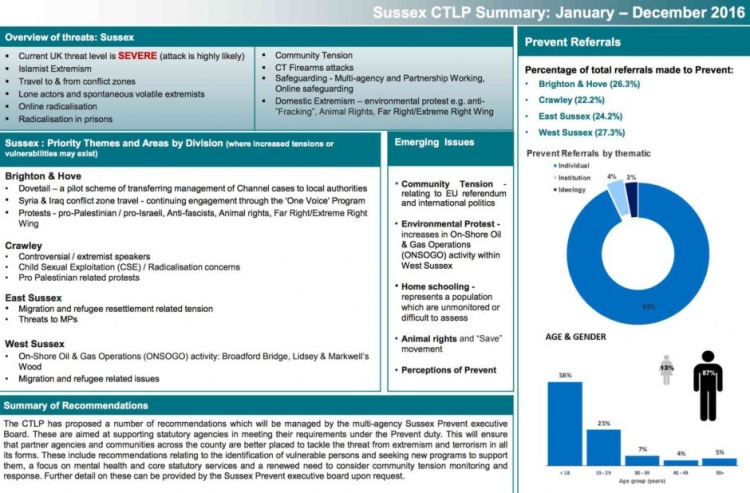Difference between revisions of "Sussex Police"
(→Labelling oil and gas protestors as potential 'domestic extremists') |
(→Resources) |
||
| Line 17: | Line 17: | ||
==Resources== | ==Resources== | ||
| + | *Netpol, [https://netpol.org/domestic-extremism/ Campaigners, not extremists], 2019 | ||
==Notes== | ==Notes== | ||
Revision as of 14:58, 4 July 2019
Sussex Police is the territorial police force responsible for policing the county of Sussex in southern England (consisting of East Sussex, West Sussex and the city of Brighton and Hove). Its headquarters is located in Malling House, Lewes, East Sussex.
Contents
South East Counter Terrorism Unit (SECTU)
Sussex police is a member force of the South East Counter Terrorism Unit (SECTU), alongside Surrey and Kent Police.
Labelling oil and gas protestors as potential 'domestic extremists'
In 2018 an investigation by Spinwatch into the policing of the anti-fracking movement found that 'despite the Home Office’s December 2016 advice that ‘support for anti-fracking is not an indicator of vulnerability’ under the Prevent strategy, 'at least seven of the 11 regional counter terrorism units (CTUs) and counter terrorism intelligence units (CTIUs) that make up the UK’s National Counter Terrorism Policing Network have either carried out monitoring or surveillance and/or unjustifiably smeared anti-fracking campaigners [over the past five years].' Sussex police was cited as one of the early adopters.
Sussex Police was one of the first forces to associate protest against oil and gas as a public threat when it identified Celtique Energy’s Broadford Bridge exploratory drilling operation ‘as a site for potential “domestic extremism”’ in early 2013 according to council documents published by Netpol.
Then in 2014, a badly redacted FOI disclosure site exposed how the Sussex force had spied on anti-fracking protestors at Cuadrilla’s controversial Balcombe site the previous summer. As DrillorDrop noted at the time:
‘The redacted section from the findings dealt with intelligence and specifically stated that the operation used covert intelligence-gathering. “Once the operation moved into August”, the report said, “it was apparent that an appropriate range of intelligence sources were being harnessed, including where appropriate ECHR [European Court of Human Rights] compliant covert means.”’[1]
Counter-Terrorism Local Profiles
Resources
- Netpol, Campaigners, not extremists, 2019
Notes
- ↑ Melissa Jones and Russell Scott, Why are counter terrorism police still spying on the anti-fracking movement?, Spinwatch, 9 September 2018
